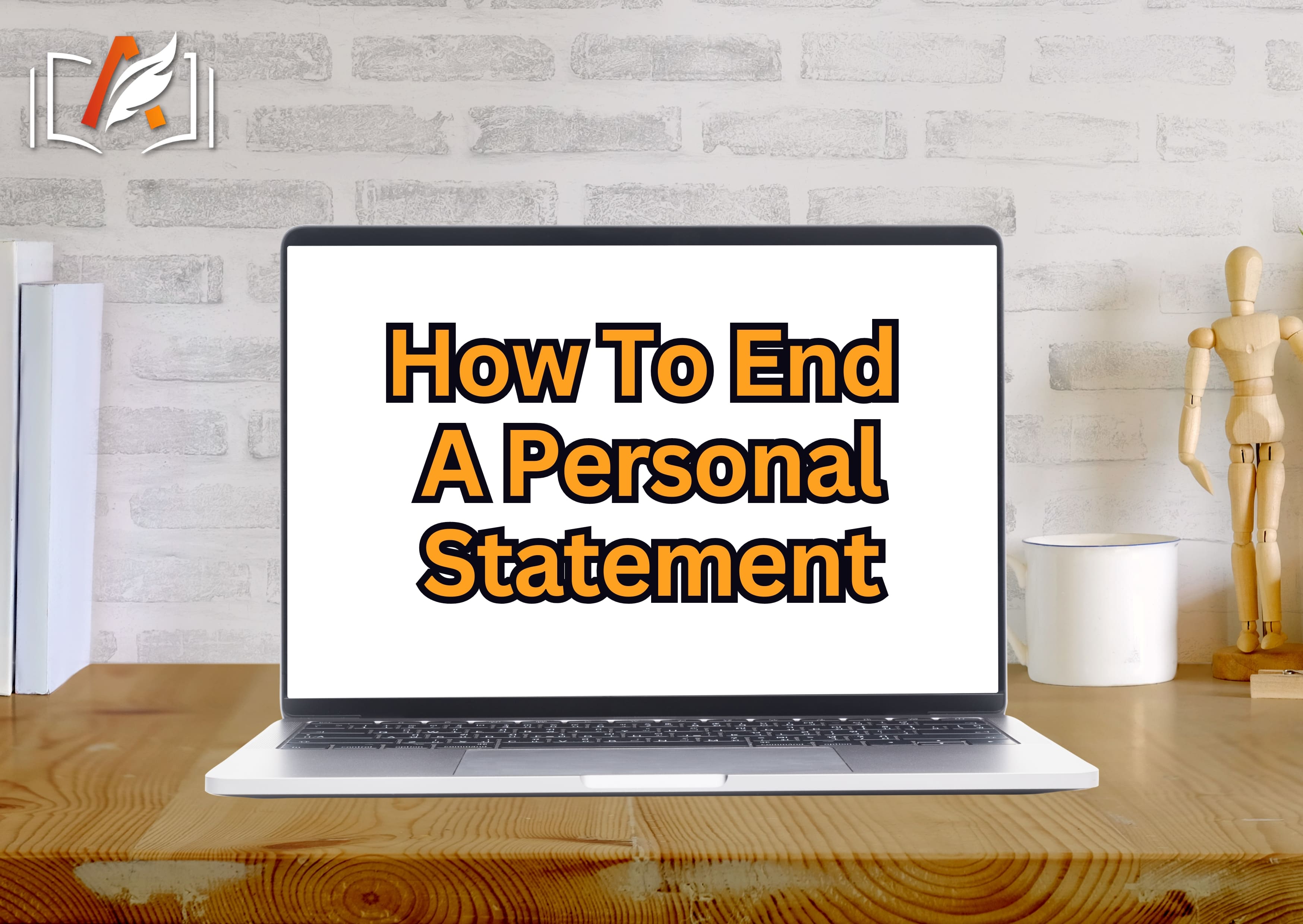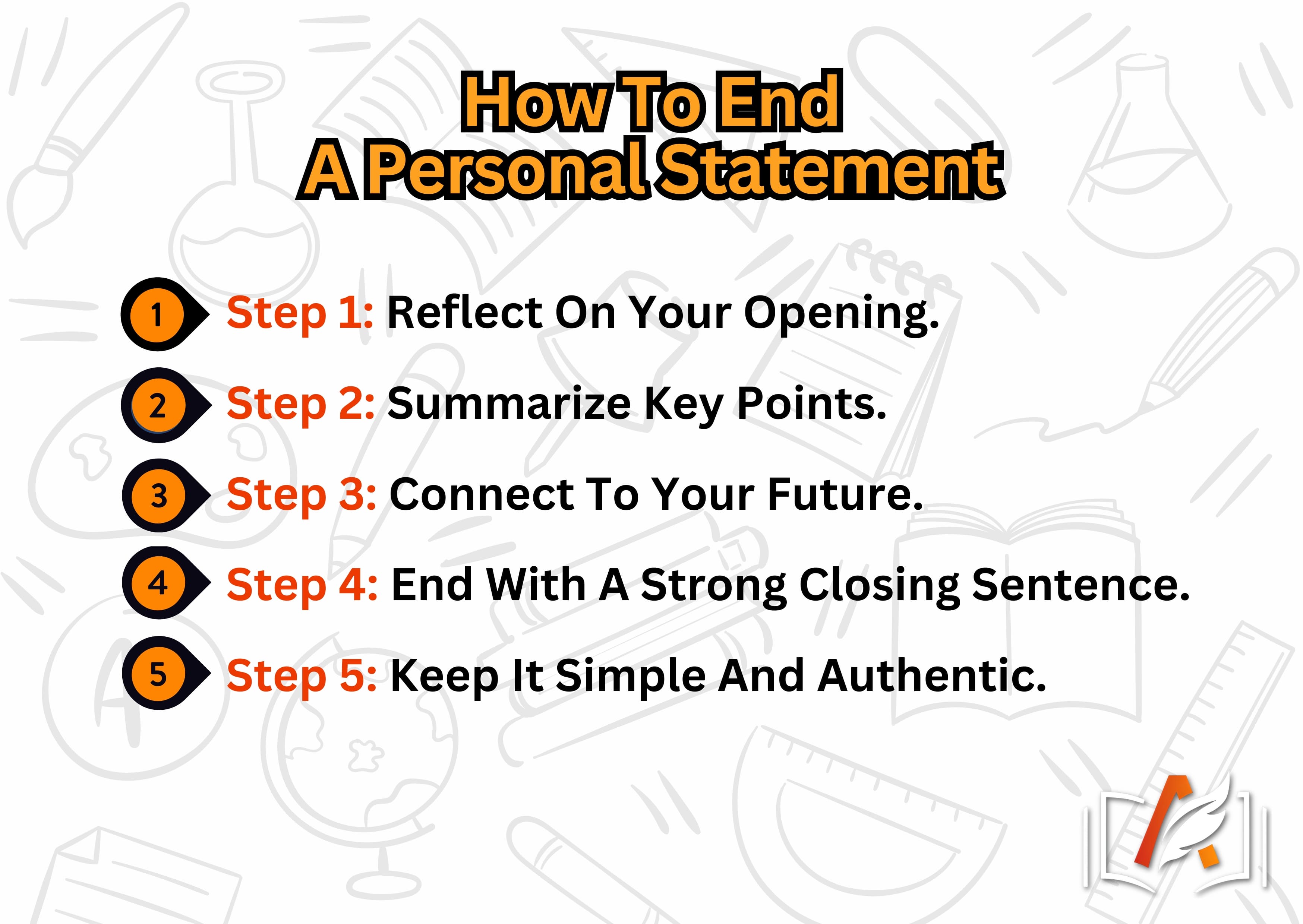 Ruby Butz
Ruby Butz

Your statement-ending paragraph is your last chance to make an impact, but it's essential to make sure that you summarise your main points and explain why you're qualified and willing to participate in the program with a strong ending. A compelling, realistic conclusion can give your application that extra oomph and show the admissions committee that you're the right choice. Just like writers on deadline, you might trip up on your statement's ending line. Here are some common mistakes to avoid:
- Repeating information already covered without adding new insight
- Introducing new ideas or topics that should have been discussed in the body
- Using clichés or overly sentimental language that doesn't add value
- Ending abruptly without a clear summary of your points
- Overstating your achievements or future aspirations
How to End a Personal Statement Correctly
Ending your personal statement firmly is crucial. If you’re ever struggling with concluding your paper, a personal statement writing service can help. If you're determined to master conclusion writing, though, here's a simple, straightforward guide to crafting a compelling conclusion.
1. Reflect on Your Opening. Go back to your introduction. A good ending will often have an echo of the opening, which sits rather like a bookend to your statement. Don’t repeat your statements word-for-word, but perhaps offer a recap of the theme you developed or the little anecdote on which you started.
2. Summarise Key Points. Most guides for how to write a conclusion for a personal statement suggest that, at a minimum, students should briefly summarise the major themes they’ve discussed. Don’t simply recite facts; instead, create a sense of closure, revealing to the reader how your experiences and goals interrelate logically, culminating in your desire to join the program.
3. Connect to Your Future. Tie your story back to the opportunity at hand. Explain how the program will be important in helping you to reach your career or academic goals. Illustrate your plans to achieve these goals and make it clear that this program is included in your plan.
4. End with a Strong Closing Sentence. When concluding a personal statement, finish with a sentence that packs a punch. Show where you are headed next. It may be your word choice, your vow of commitment to the topic, or your powerful statement of passion and readiness to work in your chosen field. In any event, make it consistent with the tone and emphasis of your essay, and make it say what you need it to say about you.
5. Keep It Simple and Authentic. Resist the urge to drown readers in big words or have grandiose claims. The conclusion should sound sincere and genuine. Don’t make it too fancy or out of reach. Every sentence should add to the main point. Nothing should wander off.

Examples of Good and Bad Personal Statement Conclusions
Finishing up your personal statement can be a make-or-break moment in your application. It's your opportunity to stand out. That is why finding a good personal statement conclusion example can be helpful. Alternatively, you can consult an online writing service for some extra tips. Below, we'll look at five examples of some good and bad ways to conclude a personal statement.
| 👍Good Conclusion Example | Analysis | 👎Bad Conclusion Example | Explanation |
|---|---|---|---|
| "I am eager to bring my passion for social justice to [University’s Name] School of Law, where I can develop the necessary skills to become a voice for the voiceless and promote fairness and equity within my community." | This is a powerful conclusion because it directly links the applicant’s passion to the program, demonstrating a clear and relevant goal. | "I really hope you will accept me into your program, as I have always wanted to study at your university." | This conclusion is a cop-out. It sounds like the last desperate effort of someone out of ideas, and it says nothing that the applicant hasn’t already made clear. |
| "Through my graduate studies at [University’s Name], I am committed to exploring innovative approaches to digital marketing, preparing myself to contribute significantly to the industry." | This example of ending a personal statement predicts the applicant’s educational plans and connects them to personal development and the field. | "I believe your program is the best place for me." | This statement is bland because it doesn’t say how the applicant hopes the program will further her goals or interests. It doesn’t say anything about the applicant at all. |
|
"Joining your esteemed biotechnology program will enable me to build on my foundation in research and participate in groundbreaking projects that challenge and expand the current scope of genetic engineering." |
This end of personal statement is gripping because it shows how the program fits into their academic and career goals. The point is made with a clear direction and goal. | "I like your school a lot, and I think I would do well there." | This is far too informal and general. There is no detail about the course of study or how it advances the student’s career path. |
| "As I strive to become an advocate for mental health, [University’s Name]’s innovative psychological research methods align perfectly with my ambition to create impactful, community-based programs." | This personal statement ending works because it connects all the dots in the applicant’s career trajectory to the university’s resources and establishes a win-win scenario. | "Please give me a chance to prove that I can succeed in your program." | This sounds more like a plea than a firm, confident proposition; it also doesn’t tell us about the applicant’s best qualities. |
| "With [University’s Name], I am confident that I will develop the robust legal frameworks needed to influence environmental policy and sustainability." | This ending of personal statement demonstrates a clear comprehension of how the program will assist in achieving the applicant’s specific aims. | "Thank you for considering my application." | It is polite but doesn’t paraphrase the statement or conclude with a powerful point about the candidate’s career plans. |
| "By joining the vibrant academic community at [University's Name], I look forward to deepening my understanding of international relations and shaping a career that bridges cultural divides, strengthens global cooperation, and promotes peace." | Here, the conclusion serves to summarise the applicant’s general aims, both in their career and academia, and to tie them to what the program offers. It sounds aspirational with a good level of detail, and it commits the applicant to the program while, at the same time, showcasing their fit with it. | "I hope to learn a lot if given the chance to attend your university." | It is a nonspecific conclusion that fails to express a real enthusiasm for the program and a lack of specific commitment to it. The tentative language diminishes the applicant's appeal, and the absence of any assertion as to qualifications of ambition leaves it weak and cold in tone. |
| "Enrolling in [University's Name] will empower me to merge my passion for renewable energy with cutting-edge research to pioneer sustainable solutions for tomorrow's energy challenges." | This example of a personal statement ending is great because it shows the candidate’s passion and how the university's resources will help realise it. It also shows ambition and a clear pathway to graduation and states why the program is necessary. | "I would be really happy if you accepted me because I have always admired your school." | This highly emotional conclusion doesn’t explain why this program appeals to the applicant’s educational and career goals. It's not a good way to end a personal statement. It’s more sentimental than strategic and relies too much on emotion. |
| "My career aspiration to become a data analyst in healthcare is driven by a commitment to improving patient care through technology, a goal I will advance through the rigorous curriculum and research opportunities at [University’s Name]." | It’s a nice way to end your statement because it links the applicant’s career aspirations directly to the School’s opportunities, explaining clearly and articulately why the applicant wants to join the program. | "I think your program could be good for me." | Don’t take this approach when thinking about how to end a university personal statement. This statement is too general; it conveys neither genuine interest, let alone understanding, of what is on offer, nor a sense of enthusiasm, nor any specific grounds for selection. |
| "Through [University's Name], I am eager to harness the power of strategic communication to lead innovative marketing campaigns that challenge conventional approaches and drive market success." | This conclusion clearly communicates the applicant’s desire to learn how to innovate in the field. It sounds ambitious and shows a willingness to apply what they have learned. | "I just really need to be in this program." | This conclusion for a personal statement is unprofessional. It fails to sell the candidate’s strengths, fit with the program, or provide any compelling reason that the school would benefit from his or her presence. |
| "Attending [University’s Name] will allow me to explore the intersection of technology and education, fostering my aim to develop accessible learning platforms that address educational disparities." | This conclusion sends a clear message that not only do the applicant’s educational objectives and altruistic goals fit well with the given program, but the program also fits well with the applicant’s envisioned future career. | "Please let me in. I won't disappoint you." | This conclusion is inappropriately informal and betrays a lack of self-confidence. It does not convey the applicant’s credentials or how the program fits professional plans. |
It’s A Wrap!
As you finish your personal statement, remember that the conclusion should help tie up your argument. Our tips on how to write a personal statement will come in handy. Having read this article, you should know how to conclude a personal statement easily. Use the tips we’ve shared to craft an ending that shows off your suitability for the program. Make sure that your closing remarks remain genuine and clear-headed. This will give the admission committee a confident and positive impression of you and a sense that they know what you want to achieve.

Meet Ruby Butz, the accomplished author at the StateOfWriting educational blog. With a Master’s in English Literature, notable articles, and extensive teaching experience, she has helped thousands of students develop strong writing skills.
Writers are verified and tested to comply with quality standards.
Work is completed in time and delivered before deadline.
Wide range of subjects and topics of any difficulty covered.
Client id #: 000410
Paper type: CourseworkAll was completed just as I wanted. Excellent support - Big thanks to all of you 🙏🤗
Client id #: 000398
Paper type: Research paperFrom my experience, StateOfWriting excels in quality and service. My paper was well-researched, unique, and expertly written. Many thanks!
Client id #: 000402
Paper type: Research paperI found this service online, ordered the research, and within eight hours I had my paper ready. And the price was great - thank you!